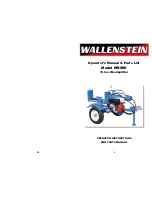
3
2.1 TRAINING & PREPARATION
Before operating this Log Splitter, read and
understand this manual completely. Become
familiar with it for your own
safety. To fail to do so may
cause serious injury.
DO NOT
allow anyone to operate this
Log Splitter who has not read
this manual.
NEVER
use your Log Splitter for any other
purposes than splitting wood. It is designed for
this use and any other use may cause an injury.
NEVER
allow children to operate your Log
Splitter nor adults lacking proper instructions.
Keep them away from your work area. Your Log
Splitter is not a toy. Only the operator is to be
near your Log Splitter during use. Keep all
others, including pets a minimum of 10 feet
away from your work zone. Flying wood can be
hazardous. If a helper is assisting in loading
logs,
NEVER
activate the control until the
helper is clear of the area. More accidents occur
when more than one person operates the Log
Splitter than at any other time.
NEVER
operate your Log Splitter when under
the influence of alcohol, drugs or medication. A
clear mind is essential for safety.
NEVER
allow a person who is tired or otherwise
not alert to use your Log Splitter.
PREPARE LOGS PROPERLY
BOTH
ends of each log should be cut as square
as possible to help prevent the log from riding
out of the splitter during operation.
2.2 SAFETY WEAR
NEVER
wear loose clothing or jewelry that can
be caught by moving parts of your Log Splitter
and pull you into it. Keep clothing away from all
moving parts of your Log Splitter. Wear proper
head gear to keep hair away from moving parts.
ALWAYS
wear safety
shoes. A dropped log can
seriously injure your foot.
ALWAYS
wear safety
glasses. A piece of
splitting log could fly off
and hit your eyes.
If you wear gloves, be sure they are tight fitting
without loose cuffs or draw strings.
Have a first aid kit available
should the need arise and
learn how to use it.
ALWAYS
wear protective
hearing devices as needed.
PROLONGED EXPOSURE TO LOUD
NOISE MAY CAUSE PERMANENT
HEARING LOSS!
Tractors with or without equipment
attached can often be noisy enough to
cause permanent, partial hearing loss.
We recommend that you wear hearing
protection on a full-time basis if the noise
in the Operator's position exceeds 80db.
Noise over 85db on a long-term basis can
cause severe hearing loss. Noise over
90db adjacent to the Operator over a
long-term basis may cause permanent,
total hearing loss.
NOTE:
Hearing loss
from loud noise (from tractors, chain
saws, radios, and other such sources close
to the ear) is cumulative over a lifetime
without hope of natural recovery.
Summary of Contents for T22B
Page 17: ...15 7 PARTS BREAKDOWN ...





























